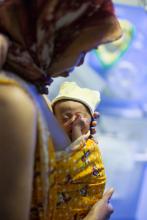
Who is caring for the newborn?
When? 19 February to 30 March 2018
How do I join? Join CHIFA here today!
Who will step up during the next decade to implement and integrate life-saving interventions and services for newborns? Decision-making leading to the implementation of newborn health services and interventions within broader health programmes requires multiple actors and levels of involvement. It is only with the mobilisation of communities and civil society, health workers and professional groups, and parents as well as leadership and champions within the health system, that the implementation of quality newborn care will be integrated into existing health system structures. These very groups are our CHIFA members, and we invite you to contribute to the next phase of the discussion.
Background
We are now four years on from the publication of The Lancet Every Newborn series. This series provided the evidence for the launch of the Every Newborn Action Plan, a global multi-partner project that aims to end preventable maternal and newborn deaths, and stillbirths by 2030. The Lancet series included an article titled “Who has been caring for the baby?” which reviewed the progress made in bringing newborn health to the forefront of the child health agenda, and reminded us of the 1990s when newborn care, particularly care for sick newborns, was viewed as too complex and technological - out of reach for lower income health systems.
The Lancet Every Newborn series provided firm evidence that interventions and services for newborns, including those born small and sick, are affordable. Rising levels of facility deliveries globally mean that more newborn deaths are occurring within hospitals, and over two-thirds of these deaths could be prevented with effective hospital care of small and sick newborns. For example, up to 70% of preterm deaths could be averted with the provision of basic inpatient care – including warmth, feeding support, infection prevention and kangaroo mother care. Such care does not need to be unaffordable for health systems; in fact, the cost of failing to provide this care could be far greater.
Questions
We ask CHIFA members (3500 child health professionals in 140 countries worldwide):
1. Who is the health worker caring for the newborn? In your countries and programmes – who is caring for small and sick newborns? Midwives and nurses? Obstetricians? Who are the champions of newborn care? Has this changed?
2. Where in the hospital are small and sick newborns cared for? What infrastructure, equipment, commodities, guidelines are needed for small and sick newborn care?
3. How is the family involved in caring for small and sick newborns? Is there family centred care in neonatal units? Are your facilities implementing kangaroo mother care? What does family-centred care mean in your context? What can be done to strengthen the quality of family-centred care?
4. Who in the ministry is responsible for newborn programmes, at the national level? What about referral systems? What about measurement and accountability?
5. Who are the key players in the global health architecture for newborn care? UNICEF is making newborns their advocacy priority this year. Is this the UN responsibility alone? What about WHO, donors, professional groups and academics?
About the CHIFA Newborn Care Project
The CHIFA Newborn Care Project supports the CHIFA community (>3500 child health professionals worldwide) in global discussions to explore and address how to improve quality of care for newborns within the overall care continuum, particularly for those born small and sick in low and middle-income countries.
The Project is supported by the Every Newborn Action Plan (ENAP), which aims to end preventable newborn deaths and stillbirths by 2030. The work is contributing valuable, diverse perspectives to inform the World Health Organization-led Quality, Equity Dignity (QED) efforts for women and newborns, building on the technical and advocacy work of ENAP.
We are grateful for the technical support of leading newborn health professionals from ENAP, London School of Hygiene and Tropical Medicine, Makerere University, Save the Children, USAID and others.
"Enter into the discussion of important child health issues. Your journey of discovery is about to begin." Prof Duke Duncan, American Academy of Pediatrics
Photo credit: Syane Luntangan

